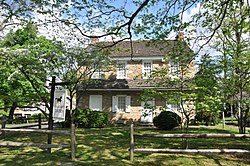Fallsington Historic District
Fallsington Historic District | |
 The Stage Coach Tavern | |
| Location | S of U.S. 1, E of New Tyburn Rd., Fallsington, Pennsylvania |
|---|---|
| Coordinates | 40°8′40″N 74°48′58″W / 40.14444°N 74.81611°W |
| Area | 170 acres (69 ha) |
| Architectural style | Late Victorian, Colonial, Federal |
| NRHP reference No. | 72001099[1] |
| Significant dates | |
| Added to NRHP | June 19, 1972 |
| Designated PHMC | June 03, 1961[2] |
The Fallsington Historic District is a historic district in Fallsington, Pennsylvania.
The district's history spans over 300 years. While William Penn resided at nearby Pennsbury Manor, he attended Friends meeting in Fallsington. The center of the district is Meetinghouse Square, where the first meetinghouse was built in 1690. The third meetinghouse, built in 1790, is currently used as a community center, the William Penn Center. The fourth meetinghouse on the square, built in 1841, still operates as a place of worship for Quakers.[3]
Historic Falsington offers tours of the district, including the interiors of three preserved buildings: the Moon-Williamson Log House, Burges-Lippincott House, and the Stagecoach Tavern.
The district was added to the National Register of Historic Places in 1972. It comprises 62 contributing buildings, one contributing site, and two contributing objects.[4]
Quaker meeting houses
[edit]The first meeting house in the district was built in 1690. Its site is marked by a bronze tablet erected in 1933. The second meeting house in the district was built in 1728. It is known as the Grambrel Roof House. After the third meeting house was built, the Gambrel Roof House was used as a school and later was converted into an apartment building with five apartments. It is three stories constructed of stone.[4]
The third meeting house was constructed in 1789 and is now used as a community center called the William Penn Center. In 1841 a fourth meeting house was built to the north of the Gambrel Roof House. This is the meeting house currently in use.[4]
References
[edit]- ^ "National Register Information System". National Register of Historic Places. National Park Service. March 13, 2009.
- ^ "PHMC Historical Markers". Historical Marker Database. Pennsylvania Historical & Museum Commission. Archived from the original on December 7, 2013. Retrieved December 19, 2013.
- ^ "Welcome". Fallsington Friends Meeting. Retrieved December 16, 2013.
- ^ a b c "Historic Fallsington" (PDF). National Register of Historic Places nomination form. Pennsylvania Historical and Museum Commission. Retrieved December 16, 2013.
External links
[edit]![]() Media related to Fallsington Historic District at Wikimedia Commons
Media related to Fallsington Historic District at Wikimedia Commons
- Historic Fallsington, Inc.
- Fallsington Meeting History Archived September 19, 2016, at the Wayback Machine
- Houses on the National Register of Historic Places in Pennsylvania
- Federal architecture in Pennsylvania
- Historic districts in Bucks County, Pennsylvania
- Open-air museums in Pennsylvania
- Museums in Bucks County, Pennsylvania
- Houses in Bucks County, Pennsylvania
- Historic districts on the National Register of Historic Places in Pennsylvania
- National Register of Historic Places in Bucks County, Pennsylvania




